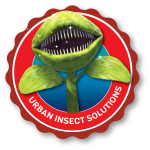Trapping system
The Yellow Delta Trap® and a Yellow Delta Trap® Sticky Liner are used in the capturing of the Carob moth (Ectomyelois ceratoniae). The Yellow Delta Trap® consists of a yellow coryx (plastic 3mm) trap, wire and white plastic lure cage. The wire is used to attach the trap to the top 1/3 of the tree. The sticky liner is placed inside the trap and the semiochemical lure inside the white plastic lure cage. After the sides have been closed, the trap is ready for placement. A datasheet is printed on the bottom of the trap to record moth counts during weekly inspections.
E.C. PheroLure®
The rubber septa used to attract the Carob moth that goes into the trap is known as the E.C. PheroLure®. The E.C. PheroLure® needs to be replaced every six (6) weeks. Any extra E.C. PheroLure® should be kept in their individual foil pouches in a fridge in order to prolong their shelf life before use.
How, where and when to hang traps
- How: Hang the trap in the top third of the tree. This will allow for maximum airflow, to distribute the semiochemical molecules (which are heavier than air) across the orchard. Hang the trap out of the way of farm implements and the direct reach of spray machines / irrigation systems, as well as away from roads, as the dust will cover the sticky liner and dry out the glue. Secure the trap firmly to the pole/stand/tree so that it does not sway in the wind. Identify each trap by a trap/ block number for later reference.
- Where: A map or layout of the orchard will assist in the correct placement of traps. In orchards with uniform topography, size and windbreaks, hang traps at a density of 1 trap per 2 – 5 ha. This is the maximum area that can be monitored by a single trap. A higher trap density may be necessary in unevenly shaped orchards, orchards with an excessive slope, hollows or where the prevailing wind may otherwise adversely affect trap catches.
- When: Tree crops: place traps in the orchard at the beginning of the production season.
Inspection and maintenance of traps
- Inspection: The traps should be inspected weekly on the same day of each week (7-day intervals). The number of Carob moths caught in the trap, together with the trap number and date needs to be recorded.
- Maintenance: Replace sticky liner if necessary. Unless the sticky liners are in very good condition, it is recommended that they be replaced at least every six to eight (6 – 8) weeks.
Disposal of Lures
E.C. PheroLure® needs to be replaced every six (6) weeks. Used E.C. PheroLures® can be disposed of in the garbage. No special precautions are required as E.C. PheroLure® is considered of no concern to human and environmental health.
Packaging
E.C. PheroLure® is sold in individual foil pouches at 3 per pack, or in bulk at 100 per pack in a big foil pouch.





